Zionist War Criminal Goldberg’s Description of My Book as ‘Perhaps the Worst book I’ve Ever Read’ is Why You Should Read It!!

Marc Goldberg, proudly describes how he became a settler ‘in time to find himself fighting the Al Aqsa Intifada as an IDF Paratrooper’. He is a curious choice to review a book on Zionism and the Holocaust. Goldberg is Head of Investigations at the CST, a Mossad Project.

Britain’s racist Home Secretary Cruella Braverman is a Welcome Guest at the CST’s Annual Dinner
Some idea of the nature of the CST’s purported anti-racism can be gauged by the fact that Home Secretary Cruella Braverman, was guest of honour at their most recent annual dinner.
The ‘review’ was commisioned by Fathom, the Internet Journal of BICOM, Israel’s main propaganda organisation in Britain,
I recently observed that the Zionists had avoided discussing my book whereas the Jewish Chronicle had devoted a whole page to an attack, by the Queen of Trivia Tanya Gold, on Asa Winstanley’s Weaponising Anti-Semitism.

I surmised that the reason for this was that the Zionists didn’t want to get into a debate on their record during the Holocaust. Judging by Goldberg’s ‘review’ I wasn’t far wrong.
As is to be expected, Goldberg barely touches on the content of my book. He prefers see it as one more anti-Semitic tome. Originality is not something which defenders of Zionism and Jewish supremacy are renowned for. Goldberg also writes for the Times of Israel and The Jewish Chronicle.
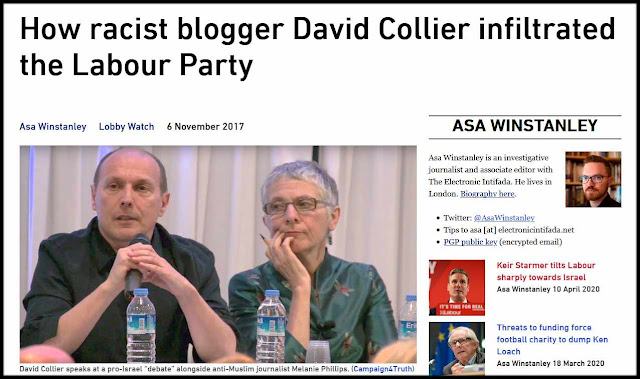
Fathom’s founding Editor Alan Johnson claimed it would be a ‘scholarly journal’ but amongst its ‘scholarly’ contributors are David Collier, the far right Zionist who refers to Palestinians in the third person and Luke Akehurst, the Labour witchhunter. Neither are renowned for their academic prowess.
Collier’s sole article was an attack on the BBC and Jeremy Bowen for having given ‘a masterclass in anti-Israel propaganda.’ The myth that the BBC is ‘anti-Israel’ is a favourite Zionist theme, completely at variance with the facts.
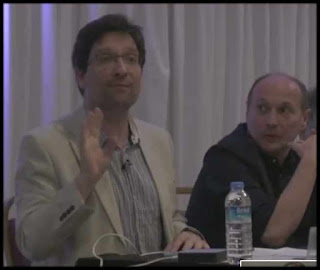
David Collier, far-Right Zionist with Tommy Robinson supporter Dr Brian, is welcome at Fathom
Fathom includes amongst its Advisor Editors Trevor Chinn, the multi-millionaire funder of Starmer and a variety of Zionist organisations as well as ex-Israeli Chief of Staff Brigadier General Michael Herzog and a former Director of Mossad, Efraim Halevy.
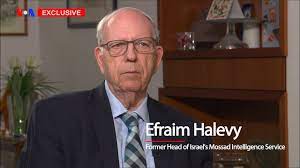
Fathom welcomes the Israeli military and security establishment as associate editors
Fathom says it welcomes articles on the ‘new’ antisemitism or antisemitic anti-Zionism’. Its prejudices are self-evident. You will not find anything in Fathom that questions Zionism or why Israel has ended up with Judeo-Nazi Ministers like Ben-Gvir and Smotrich. Despite its pretensions Fathom is very much a propaganda journal.
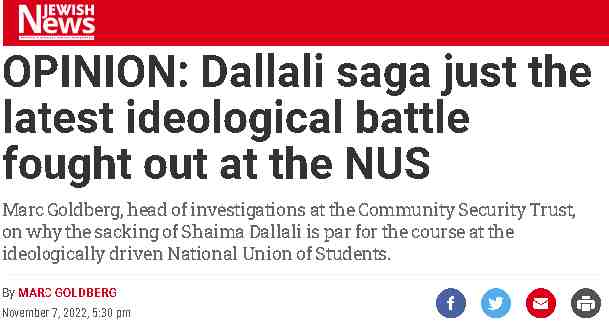
Goldberg was part of the witchhunting against Black President of NUS
Despite its academic pretensions, Fathom is overladen with taken-for-granted Zionist clichés and assumptions. Goldberg’s review is consistent with this. This is not inevitable in a Zionist journal. The Journal of Israeli History really does carry scholarly articles and I cite it more than once in my book. But Fathom? It is afraid to pierce beneath the surface of Zionist propaganda for fear of what it may find.
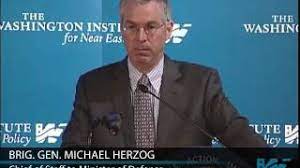
Another military man on Fathom’s Editorial Board
In its Introduction we are told that
‘Fathom’s highest quality editorship and insistence on careful fact-checking is fast propelling the journal into becoming essential reading for every person involved in policy and politics in the region and on the international scene.’
If the editors of Fathom believe this then they are suffering from a disconnect from reality that borders on a psychosis. There is no better example of falsifications than Goldberg who writes:
The author was only recently held by a British Court to be a ‘notorious antisemite’. In my opinion this book is antisemitic rubbish.
If you redefine anti-Semitism to mean anti-Zionism then I’m an anti-Semite. But Goldberg’s statement was a lie. Despite my pointing this out in their comments it’s still there. Is this fact checking?

Britain’s racist Home Secretary bunged the CST another £1 million this year
In 2017 I sued the Campaign Against Antisemitism for libel. Instead of defending their comment that I was a ‘notorious anti-Semite’ as factually true under s.2 Defamation Act 2013 they asserted that what they said was an honest opinion under s.3 even if it were untrue.
The Court agreed with the CAA that accusations of anti-Semitism are opinion and not fact. I therefore had to prove that the opinion of the CAA was dishonest, i.e. malicious, which is a high bar legally. At no stage did the Court offer an opinion of its own.
Nonetheless I have reason to be grateful to Goldberg. His description of my book as ‘perhaps the worst… I’ve ever read.’ is more valuable than all the academic recommendations on the back cover!
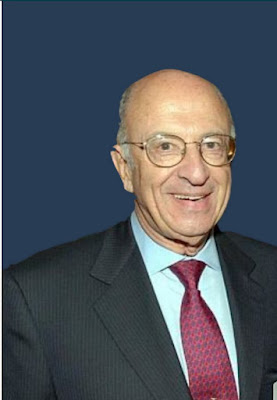
Sir Trevor Chinn – Financier to a Host of Racist Individuals
Goldberg Avoids All The Difficult Questions
From February 1940 reports came into the Jewish Agency [JA] about how the Jewish population of Poland were being ‘mercilessly and cruelly annihilated’ yet no Palestinian Zionist body even discussed these reports. Why? Dina Porat, the Chief Historian at Yad Vashem admits that ‘these questions are hard to answer’ because ‘Ben-Gurion’s concentration on post-war goals shifted attention away from the present plight of Europe’s Jews.’
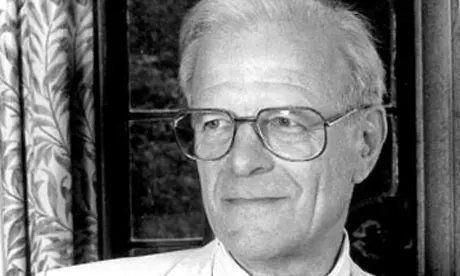
Dr Noah Lucas, a critical Zionist historian who I quote in my book
A serious historian, even a Zionist historian, would at least attempt to tackle such questions. Throughout my book I quote critical Zionist historians such as David Cesarani and Noah Lucas and it is a sign of the lack of commitment to scholarly inquiry that Fathom chose a propagandist rather than a historian to review my book.
Perhaps there is a Zionist equivalent to Godwin’s law? How long can a Zionist last out before attacking an opponent as anti-Semitic? Perhaps we should call it Goldberg’s Law. The beauty of attacking your opponents as anti-Semitic is that it saves you having to engage with their arguments.
The reason that Zionists resort to accusations of ‘anti-Semitism’ so readily is that it’s impossible to defend Israel’s actions. How do you defend evicting Palestinians from their homes to make way for messianic settlers? How do you defend demolishing the homes of Palestinian but not Jewish terrorists? How do you defend the right of hundreds of Jewish communities in Israel to legally bar Arabs?
Goldberg accuses me of ignoring ‘the work that the Zionist movement … did to fight Hitler’ and ignoring ‘the challenges faced by the Zionist movement ….’ He complains that my book
doesn’t consist of a full review of the work undertaken by the Zionist movement against the Nazis, offers little to nothing in the way of context.
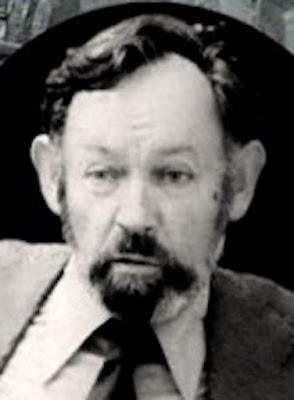
Peter Bergson, dissident Zionist whose Emergency Committee campaigned to save Jewish refugees – the American Zionist leaders sought his deportation
The problem is that not only did the Zionist movement do virtually nothing but they obstructed the work of others. I paid tribute to the dissident Zionists led by Hillel Cook (Peter Bergson), who were responsible for the formation of the War Refugee Board. I also paid tribute to the Zionist fighters in the ghettoes who disobeyed the instructions from Palestine to cease fighting the Nazis.
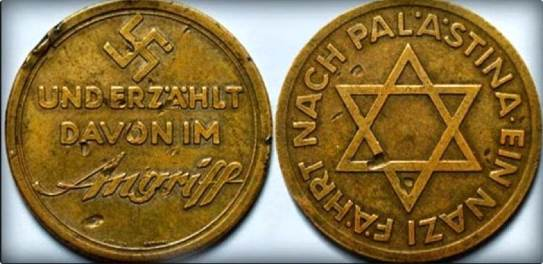
Medal struck to commemorate when the head of the Gestapo’s Jewish Section, Baron von Mildenstein, sampled the hospitality of the kibbutzim
When the vast majority of Jews supported boycotting Nazi Germany, the Zionists opposed it before they negotiated a trading agreement, Ha’avara, with Hitler. How could they fight Hitler when they were straining to increase their trade with the Nazis?
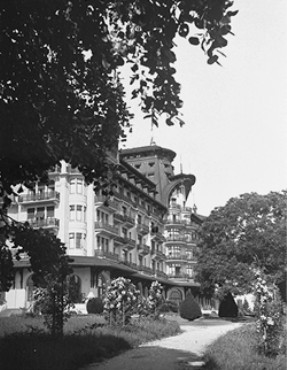
The Conference Centre Where the Evian Conference Was Held
I described in detail the Zionist hostility to the face-saving Evian Conference, called by Roosevelt to discuss the plight of Jewish refugees, in July 1938. Citing Boaz Evron’s Jewish State or Israeli Nation, I quoted Menachem Ussishkin at a meeting of the Jewish Agency Executive [JAE] of 26 June 1938:
Mr Greenbaum is right in stating that there is a danger that the Jewish people also will take Eretz-Yisrael off its agenda, and this should be viewed by us as a terrible danger. .. All other emigration countries do not interest him… The greatest danger is that attempts will be made to find other territories for Jewish emigration. (my emphasis).
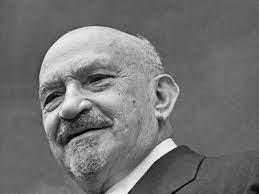
Chaim Weizmann – first President of the Israeli state
I quoted from a letter of 13 February 1938 to Stephen Wise, the US Zionist leader, from George Landauer. It was a letter written at the behest of Chaim Weizmann, the Zionist Organisation President.
Even if the Conference will not place countries other than Palestine in the front for Jewish immigration, there will certainly be public appeals which will tend to overshadow the importance of Palestine…. it may bind Jewish organizations to collect large sums of money for assisting Jewish refugees, and these collections are likely to interfere with our own campaigns
The consensus of the meeting was to ‘belittle the Conference as far as possible and to cause it to decide nothing….’
Despite hoping that the Evian Conference would come to nothing, the leaders of the Zionist movement afterwards cynically criticised it for its failures.
Goldberg has nothing to say about this or the opposition by the Zionists to rescue where it was not to Palestine. Goldberg says he finds ‘both ludicrous and false’ my suggestion that the Zionists obstructed rescue. However he saves us the opportunity to learn why.
Goldberg’s ‘review’ consists of a series of assertions, none of which he substantiates. He says ‘many of his quotes serve to obscure the meaning of the sources they’ve been taken from’ but there are no examples.
Goldberg alleges that ‘Greenstein has managed to omit every substantive act of resistance Zionists took against the Nazis’. His main example being Aliya Bet, the illegal immigration of Zionist pioneers, often with Gestapo connivance, into Palestine.
In fact I do mention it when I cited Dina Porat as saying that through this ‘we gave meaning to life, we raised the prestige of the Zionist movement.’ I commented that ‘The arrogance of this statement is breathtaking. In other words saving Jews to anywhere but Palestine was meaningless.’
6,000 people were estimated to have been rescued. Zionist prestige was for Porat the most important thing. The other example Goldberg gives of Zionist resistance to the Nazis is when 33 Haganah agents were parachuted into Europe in March 1944. Goldberg argued that:
this episode serves as an interesting insight into Zionism during the Holocaust. It shows that the Jewish Agency Executive succeeded in convincing the British to drop Jews from Palestine behind enemy lines to carry out operations that might help Jews.
32 agents at the fag end of the war were unlikely to bolster the existing, highly developed resistance in Nazi occupied Europe. I quoted Zionist historian Yechiam Weitz that
Their primary goal was in effect to influence the survivors to choose Palestine as their ultimate destination. This point is corroborated by testimonies from that period.’
Goldberg thinks my claim that the Kindertransport, in which 9,354 child refugees were brought to England ‘despite Zionist hostility’ ‘an odd thing to say’. Similarly my assertion that ‘the Zionist leaders instead demanded that the children be brought to Palestine, which the Colonial Office rejected.’ Goldberg claims that Chaim Weizmann had been one of the founders of the Central British Fund for German Jewry, which organised the Kindertransport and that both Weizmann and Lionel de Rothschilds ‘personally lobbied Chamberlain to allow the children to come to Britain.’
There were in fact 6 people on that particular delegation. Weizmann was one of 10 original founders of the CBF but he played little part in it. Those responsible for its founding were the anti-Zionist leadership of British Jews, Neville Laski and Leonard Montefiore in particular.
Goldberg accuses me of failing to mention Weizmann’s presence at the founding of the CBF. The CBF consisted of the traditional bourgeois leadership of British Jewry, which was anti-Zionist. Simon Marks and Weizmann had only been invited to join it in order to buy off Zionist hostility to their rescue activities.
The Zionists resented the fact that appeals for Jewish refugees were likely to displace their own appeals. The Zionists only agreed to cooperate because it was agreed that the first destination of refugees would be Palestine. Amy Gottlieb wrote:
‘there can be little doubt that this was the assurance that Simon Marks, Chaim Weizmann and other Zionists had demanded in return for their co-operation.’ (Men of Vision, p.29)
The anti-Zionist leaders had bought off Zionist opposition by agreeing to their demands. The idea that Weizmann lobbied Chamberlain for Jewish refugees to come to Britain beggars belief. I quoted Malcolm MacDonald, the Colonial Secretary, recalling:
I remember at the time that Weizmann’s attitude shocked me. He insisted on the children going to Palestine. As far as he was concerned it was Palestine or nowhere.
When MacDonald refused to guarantee that the children would go on to Palestine Weizmann told him that: ‘We shall fight you – and when I say fight I mean fight.’
Ben Gurion, Israel’s first Prime Minister was even more explicit:
If I knew that it would be possible to save all the children in Germany by bringing them over to England, and only half of them by transporting them to Eretz Yisrael, then I would opt for the second alternative. For we must weigh not only the life of these children, but also the history of the People of Israel.
Goldberg complains that in my account of the Warsaw Ghetto Uprising, I was more interested in attacking Zionism. That I sought to
‘undermine the significance of the Zionism to the fighters yet,… during the uprising in the ghetto ‘for two days both the Polish and Star of David flags flew, visible to thousands of Poles’ … Who raised that flag if the fighters were waning in their Zionist politics?
Goldberg failed to understand that I wasn’t suggesting that the Zionist ghetto fighters weren’t Zionists, rather that Zionism had nothing to do with their decision to resist. The Revisionist Zionists, who had staffed the Jewish police who carried out the roundups, also fought a separate struggle against the Nazis and it was they who flew the Star of David.
Subjectively the Zionist fighters in the Ghetto remained Zionists, but objectively their decision to fight owed nothing to Zionism and everything to do with the fact that they were organised and understood that the Nazis intended to murder them.
Dina Porat described how ‘there was panic in Palestine’ after the Warsaw Ghetto Revolt. Melech Neustadt of the JAE urged the Zionist youth movement leaders in Palestine to instruct their members in Poland to leave ‘and thereby stop the armed uprisings’. Why? Because they ‘would ultimately deprive the Yishuv of the cream of Europe’s potential pioneering force.’

Frumka Plotnika – fighter in Warsaw Ghetto – Refused Zionist Demands to go to Palestine
When a Zionist emissary arrived in Bedzin in July 1943 to persuade Frumka Plotnicka to leave, she replied ‘I have a responsibility for my brethren… I have lived with them and I will die with them.’ Zionist youth such as Zivia Lubetkin, refused on principle to leave. (160/161). Zionism saw the main fight as being against the Arabs, not the Nazis. Goldberg has nothing to say on this.
Goldberg questions my assertion that Jacobo Timerman, the Editor of La Opinion, ‘came under attack from the Zionist movement’. It’s true that I cited an article in the Jewish Chronicle ‘Timerman Stirs Jewish Discord’ (14.8.81) by Jose Smilg, its correspondent in Buenos Aires, who alleged that it was Timerman’s fight for human rights which was ‘inspiring a rash of anti-Semitic articles in the Argentine press.’’
But I also gave a number of other examples such as
i. Ma’ariv, the Israeli newspaper, withdrew from an agreement to publish Timerman’s book Prisoner Without A Name, Cell Without a Number.
ii. I described how in the United States ‘Timerman was attacked by right-wing Zionists who believed he ‘asked for what he got’.
iii. I described how when Timerman received the Golden Pen of Freedom Award the venue was shifted from the Knesset to the Hebrew University in order not to offend Argentine’s anti-Semitic regime.
iv. I also described how, when Timmerman published ‘The Longest War’ opposing the Lebanon War, Israel’s Deputy Foreign Minister, Yehuda Ben-Meir, described his book as ‘a collection of calumnies and lies arising from his own self-hatred.’
v. When Timerman died, on 11 November 1999 he received glowing obituaries internationally but Israeli papers ‘provided only terse reports.’
Argentina’s anti-Semitic regime, between 1976 and 1983 murdered up to 3,000 Jews without so much as a Zionist whisper.
Goldberg described my book as ‘almost unreadable’. I accept that it must have been traumatic to have to read nearly 500 pages in which all those myths one had been brought up with were consigned to the fire. Such an experience can cause cognitive dissonance.
Goldberg could not understand why I wrote that it was only the Nazis who bore responsibility for the organisation of the Holocaust, yet I also said that the Zionists bore a moral responsibility for having obstructed the rescue of many thousands of Jews. Goldberg sees a contradiction where there is none.
Goldberg is sure that I have contradicted myself when I write that everywhere in Europe Zionism was a distinct minority among Jews yet I assert that
The Judenrate were composed of the traditional leadership, over two thirds of whom (67.1 per cent) consisted of Zionist supporters of all factions.
Goldberg asks ‘how both these things can be true’ suggesting that I am ‘determined to prevent the facts from standing in the way’ of my beliefs? Or it could be that the Goldberg assumes that the Jewish leadership politically reflected those they presided over?
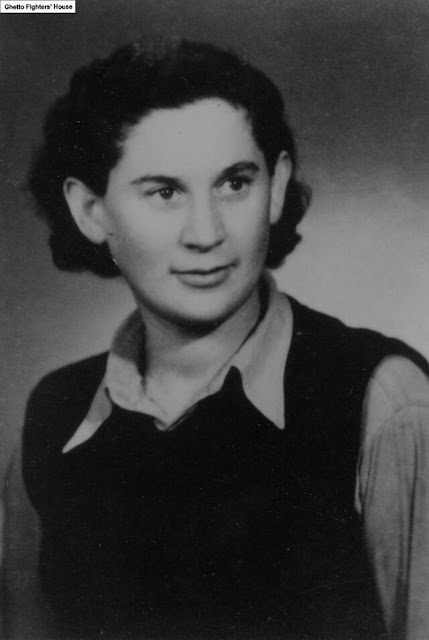
Zionist resistance fighter Chajka Klinger condemned the collaboration of the Judenrat with the Nazis
If Goldberg hadn’t found my book so difficult to read he would have seen that I cited a Zionist resistance fighter Hayke Klinger who, in a speech in Palestine in March 1944 said: (148)
And precisely because those who stood at the head of most of the communities were Zionists, the psychological effects on most of the Jewish masses vis-à-vis the Zionist idea was devastating, and the hatred towards Zionism grew day by day…
Most disturbing of all was that I included others in the Holocaust:
‘what was not part of the Holocaust? We are left in the dark as to where, for Greenstein, the Holocaust begins and ends.’
I referred to the murder of the Disabled, 3m Russian POWs and 1m Gypsies whereas Zionism considers the Holocaust a Jewish-only affair. According to Gerhard Riegner ‘Drawing universal lessons from the Holocaust meant the ‘plunder of [Jewish] moral capital.’ All other groups come under Genocide, not Holocaust.

Collier, a contributor to Fathom, with Jonathan Hoffman – linkman between far-right Zionists and fascist groups
Boycott & Ha’avara
Goldberg criticises my reliance on the statistics of Edwin Black, author of The Transfer Agreement, the definitive book on the subject of Ha’avara. Goldberg cites a critical article by Richard Levy in Commentary (September 1984) in which he says of Black that his ‘weakness as a historian emerges in his treatment of the politics of the anti-Nazi boycott movement.’ It is pertinent to note the comment of David Wyman, Emeritues Professor of History at Massachusetts University in a letter to Holocaust & Genocide Studies [Vol. 11, p.277]:
‘It is entirely to the point to note that Levy is a retired nuclear engineer who has no formal training as a historian.’
It is sometimes difficult to understand Goldberg’s reasoning. For example he criticises me for citing Black in respect of the popularity of the Nazi boycott in Latvia whilst not mentioning that the Nazis had reached an agreement with the Latvian government to prevent the boycott. Goldberg suffers from ‘excessive love of authority syndrome’. He assumes that the Nazis’ successful pressure on the Latvian government to outlaw the Boycott was popular. Why?
Goldberg’s Failure to Understand the importance of the Boycott or Ha’avara
When Hitler was ‘elected’ Chancellor on March 5 1933 Jews spontaneously reacted by boycotting Nazi Germany. Only the Zionist movement and the Jewish bourgeoisie opposed the Boycott. The Zionists because they wanted to take advantage of the Nazi regime to build their ‘Jewish’ state. I quoted Auschwitz survivor Elie Wiesel:
‘Surely, Jewish Palestine… needed money to finance its development, but this brazen pragmatism went against the political philosophy of a majority of world Jewry. There developed a growing perception that instead of supporting and strengthening the boycott, Palestine was, in fact, sabotaging it.
Elie Wiesel
Wiesel was a fervent Zionist but even he felt obliged to speak out. The Zionist movement was not interested in saving Jews. Its sole concern was its settler-colonial project in Palestine.
I have also ‘overblown the importance of this footnote of Holocaust history’. Even worse I am implying that world Jewry was capable of organising the overthrow of the Nazi government, which Goldberg says is akin to Nazi propaganda, i.e. anti-Semitic!
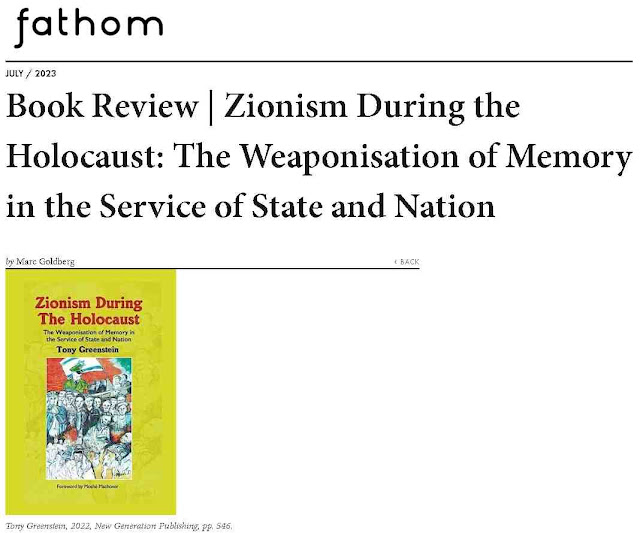
Of course by themselves Jews was not able to overthrow the Nazi regime but the whole point of the Boycott campaign was to persuade non-Jews to join them. Large sections of the labour movement supported it because they understood that the principal enemy of the Nazis were German trade unions and working class organisations.
I wrote that ‘The Nazis were ‘astonished’, given the record of Polish anti-Semitism, that the advent of the Nazis had given birth to a widely supported Boycott movement.’ (p.111) Despite the Zionist slander that most Arabs were Nazi supporters, Egypt had an almost complete Boycott. To the Zionists working with non-Jews to oppose anti-Semitism was and is anathema.
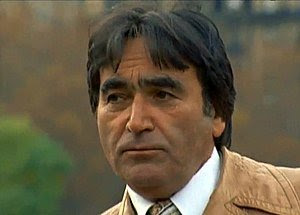
Jewish hero, Auschwitz escapee and anti-Zionist Rudolf Vrba bitterly criticised Zionist collaboration with the Nazis
Goldberg seeks to play down the economic importance of Ha’avara. His suggestion that Ha’avara trade accounted for only 1/1000 of German exports to Palestine is nonsense. Palestine remained a relatively small market for Germany but for the Jewish economy it was very significant. The reason that Hitler authorised the continuation of Ha’avara in 1937 was not for economic but political reasons. Ha’avara ensured that the defeat of the Boycott. The Zionist movement played the part, as Jewish Labour Leader Boris Vladeck termed it of ‘the official scab agent against the boycott in the Near-East’. The Zionists were happy to scab on the Boycott.
Goldberg wondered ‘why the fears of German Jewry aren’t addressed by Greenstein.’ In fact I did address these so-called fears, which suggests that Goldberg hasn’t properly read my book.
Publicly German Jews opposed the Boycott. If they had supported it they would have been killed. It was these denials that Goldberg relies on. I quote (108-9) from a message to Stephen Wise which said ‘Do not believe the denials, nor the Jewish denials.’ Moshe Beilinson, for the Labor Zionist movement, admitted that all Germany’s Jews, including the Zionists, supported the boycott. What I wrote was:
The Boycott forced the Third Reich to vigilantly restrain anti-Jewish violence. Goering was desperate. ‘Germany simply could not afford further export reductions’ and without exports ‘there would be economic death.’
The Jewish Chronicle, (‘The Unclean Thing,’ 27.12.35.) a supporter of Zionism, nonetheless thundered:
We object to the transfer of their assets in the form of the products of German factories and German employment. We say that that is aiding and comforting one of the most savage oppressions, even in Jewish history…. It breaks the united Jewish boycott front, a front let it not be forgotten, with which non-Jewish sympathisers were also aligned.

The Mothers of the Disappeared – Abandoned by the Zionists
Argentina – A post-war example of Zionist collaboration
In 1994 a bomb exploded in the Jewish Community Centre in Buenos Aires. Almost immediately Israel and the United States blamed Iran and Hezbollah. Yet as Bill Brencick, chief of the political section in the US embassy from 1994 to 1997, acknowledged in a 2007 interview, suggestions of Iranian responsibility were based solely on a ‘wall of assumptions’ and that there was ‘no hard evidence’.
In 2014 a former police spy, Jose Alberto Perez, who had infiltrated the Jewish community in Buenos Aires on behalf of the Federal Police, revealed to two investigative journalists, Miriam Lewin and Horacio Lutzk, that he had been ordered to turn over blueprints to the community’s building to his police case officer “Laura”. ‘Laura’ had ordered him to find out the involvement of the Jewish community in the ‘Andinia’ conspiracy theory which held that Marx, Einstein and Freud were at the centre of a Jewish conspiracy against Argentina.
The Military Intelligence Agency SIDE oversaw the investigation of the bombing. The SIDE Unit handling the investigation was riddled with the same anti-Semitic officers from the Cabildo group, who had tortured and murdered Jews during the rule of the Junta.
The anti-Semitic right in the Argentinian state was happy to go along with Israel and the United States but Perez was under no doubt that the bombing was carried out by dissident elements in the police and security establishment.
Goldberg denies my claim that Argentinian prosecutor Alberto Nisman committed suicide. ‘He was actually murdered.’ Goldberg prefers the version of events offered by the anti-Semitic Argentine state and Israel but there is considerable doubt as to whether Nisman was murdered. An article in the Buenos Aires Times (17.1.00) refers to a 6 part documentary The Prosecutor, the President and the Spy which examines
the prosecutor’s still unsolved death only days after he accused Fernández de Kirchner of colluding with Iran to allow the alleged authors of the bombing to go free.
The article refers to Pablo Duggan, author of the book Who Killed Nisman?, who states:
“Nisman committed suicide. It’s all proven in the file. This case should have been closed three years ago.”
The article tells how the series ‘which highlights the role played in the AMIA investigation by the intelligence services and the CIA – has caused a storm of reaction on Twitter.’ Its conclusion? The documentary tips the scales towards suicide.
The Argentinian state is riddled with anti-Semites, not the fake variety that Goldberg spends his time attacking. He is more than happy for Iran and Hezbollah to get the blame for the bombing. But given the confession of the police spy Perez and the record of the Argentinian state, it is highly likely that the perpetrators were home grown. Israel and its apologists like Goldberg want to exonerate genuine anti-Semites because they aren’t the real enemy.
Goldberg takes exception to my quote regarding the SS Intelligence Service that ‘Any attempt to foster anti-Jewish sentiment is strictly prohibited. Provoking the Arabs against Jewish immigrants only serves to harm the Reich.” Goldberg cites a 5 man Nazi commando group who were parachuted into Palestine with weapons and explosives in 1944. Their purpose was to instigate riots between Arabs and Jews.’
The only problem is that the quote from the SS was in a report dated January 1937. Of course 7 years later, when the Nazis were desperate, the idea of promoting Jewish-Arab riots was both appealing and elusive. In 1937 the Nazis were interested in Jewish emigration to Palestine. The last thing they wanted to encourage was Arab opposition. Hitler was opposed on principle to allying with indigenous peoples against their colonial masters. Not being a historian Goldberg telescopes 7 years into one.
Goldberg compares my observation that many Germans dismissed rumours of the murder of Jews as “atrocity propaganda” or refused to believe that such things could happen, with my statement:
‘What was unforgivable was that the Zionist leadership in Jerusalem refused to believe the evidence, even when it came from Jewish witnesses.’
Goldberg entirely misses the point. Ordinary Germans didn’t have any evidence of the systematic extermination of the Jews whereas the Zionists did have this evidence. Their offices in Geneva and Istanbul were in possession of reports of the killings very early on. ‘Exchange Jews’ who had been swapped with German prisoners returned to Palestine three times with detailed stories of what was happening yet the Zionists refused to believe them. They had other priorities.
I am also very critical of the British and US leaders who were also in possession of information about Auschwitz and chose to do nothing.
Goldberg doesn’t like the comparison between the Zionist movement, the Catholic Church and the USSR. The former had two billion adherents and the latter was a ‘large, powerful country.’ But the Catholic Church was also under attack. Hundreds, if not thousands, of its priests had been murdered in Poland. Yet despite this many of the Apostolic Nuncios had done all in their power to prevent the extermination of the Jews. In a number of countries the Church had sheltered Jews despite the risks. The Soviet Union had rescued up to 1.5 million Jews. No one expected the Zionist movement to match this but nor did one expect them to sabotage rescue attempts either.
Goldberg argues that I miss ‘the fact that Zionists were Jews who were caught up in and victims of the Holocaust the same as all other Jews.’ He deliberately conflates individual Zionists living under Nazi occupation with the Zionist leadership in the West and Palestine.
I pointed out in the final paragraph of p.61
To the Zionist leaders the Holocaust was a distraction. If saving Jews had been a priority, they would have established a central co-coordinating body to pull together all the various reports in order that they could identify where the destruction was taking place and where rescue was possible. The tiny Al-Domi group in Palestine suggested this but they were ignored.
Goldberg takes exception to what he calls my ‘Quote Mangling’ an example of which is where I write
‘In October 1941 David Ben-Gurion saw the catastrophe that was unfolding ‘as a source of strength and momentum’ which would accelerate the realisation of Zionism.’
Goldberg complains that ‘The quote isn’t from Ben-Gurion himself but from Shabtai Teveth’s biography of Ben-Gurion.’ That’s right. Which is why the footnote refers to Teveth’s book! But it is a devastating quotation coming as it did from Ben Gurion’s official biographer who went on to say that
If there was a line in Ben-Gurion’s mind between the beneficial disaster and an all-destroying catastrophe, it must have been a very fine one.’
Shabtai teveth
Goldberg objected to my pointing out that the far-right Alternative for Germany, which is riddled with neo-Nazis ‘loves the Jewish state’ and wants to make BDS illegal, Goldberg finds one individual member of the AfD who went to an anti-Zionist conference in Tehran to disprove this!
Goldberg suggests that Nick Griffin of the BNP is a supporter of the Palestinians. Yet when Israel attacked Lebanon in 2006. Lee Barnes, their legal advisor wrote on the BNP site that:
As a Nationalist I can say that I support Israel 100 % in their dispute with Hezbollah. In fact, I hope they wipe Hezbollah off the Lebanese map and bomb them until they leave large greasy craters in the cities where their Islamic extremist cantons of terror once stood. The 21st Century is the Islamic Century. Unless we start to resist the threat of Islamic extremism then within 100 years the West will have become Eurabia.
Ruth Smeed of the Board of Deputies was quoted as saying that
the British National Party website is now one of the most Zionist on the web – it goes further than any of the mainstream parties in its support of Israel.’
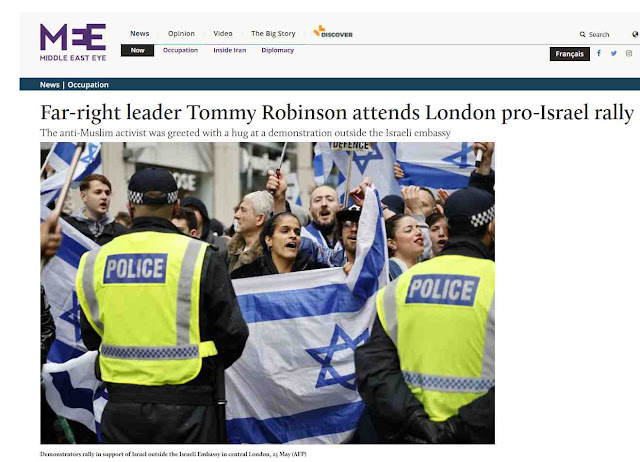
Who was the BNP leader at that time? Nick Griffin. And who was welcomed like a hero at the last pro-Israel demonstration outside the Israeli embassy in May 2001? Tommy Robinson!
The vast majority of the far right combines both anti-Semitism and support for Israel and Zionism. Richard Spencer, the neo-Nazi founder of the alt-Right protested that he was a White Zionist.
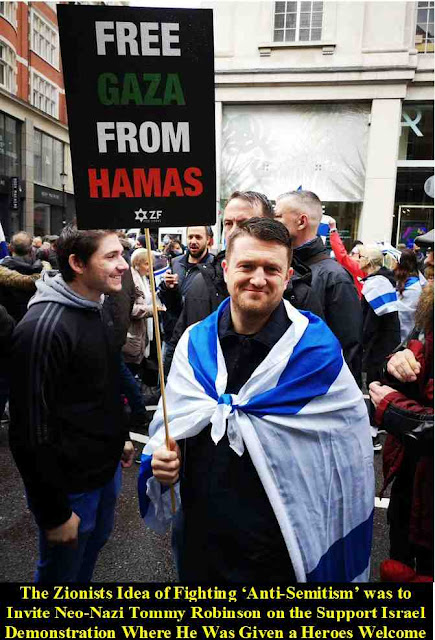
Goldberg recommends that readers read Eichmann’s Jews by Doron Rabinovici. I cite Rabinovici’s book as ‘one long apologia for the Kultusgemeinde, the Vienna Judenrat’. Rabinovici wrote that:
It was not because the Jewish councils betrayed the Jewish community but because they attempted to act in their interests that the Jewish functionaries were condemned to see things from the perspective of the authorities. They had to think like Nazis in the interests of the Jews.
So ferreting out the hiding places of Jews avoiding deportation was in the interests of the Jews! The President of Israel’s Supreme Court,Yitzhak Olshan was dismissive of this argument:
no matter how the Judenrat acted, they served the Nazis… Even those who served the interests of the Jewish communities assisted the Nazis.
Goldberg sympathises with the Judenrat and those who collaborated with the Nazis. Like the Zionist historians, he understands the ‘dilemmas’ of the Judenrat who did the work of the Nazis and dismisses those, including the Zionist fighters in the ghettos, who had nothing but loathing for the Judenrat, as did most holocaust survivors. Goldberg is nothing if not an establishment Zionist.
Goldberg take exception to Ken Loach’s calling my book ‘essential reading’ and his claim that my ‘detailed reference to original sources cannot be ignored.’ Goldberg concludes: ‘Perhaps it cannot be ignored, but it should be.’ This is Fathom’s idea of a review.
Goldberg writes of the ‘wave of outrage’ that greeted Loach’s play Perdition a quarter of a century ago. The outrage was the Zionist lobby trying to prevent a play being shown in the Royal Court Theatre that they didn’t like. Perdition was about Hungary in 1944 when a pact between the leader of Hungarian Zionism, Rudolf Kasztner, with Eichmann resulted in a train for the Zionist elite out of Hungary and complicity in the deportation of a half a million Jews to Auschwitz.
Robert Wistrich of Tel Aviv University, an ardent Zionist wrote that it was ‘unwise’ to attack the play as anti-Semitic, adding that ‘the entire Jewish leadership of that generation – including the Zionists – failed the test of the times.’ Wistrich conceded that ‘the major priority of the Zionist movement at the time was indeed building Palestine’. He accepted that ‘a reasonable case’ could be made that Zionists did not fight anti-Semitism before 1939
with the appropriate vigour’ and further ‘that some Zionists wanted to develop a ‘special relationship’ with the Nazis…. To deny these points… is not only stupid but unnecessary.
Goldberg’s ‘review’ perpetuates this stupidity. His ‘review’ isn’t particularly sophisticated because the Zionist defence of their record during the holocaust comes up against the facts. All they can do is shout ‘anti-Semitism’ hoping it will drown them out.
For those who wish to see for themselves whether my book qualifies for the title of ‘worst book ever’ you can email me at [email protected] to inquire about buying a copy!!
Tony Greenstein